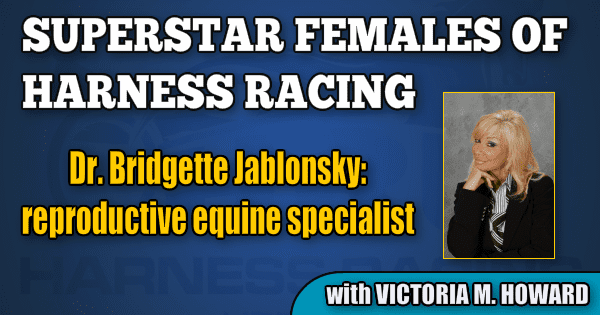Dr. Bridgette Jablonsky: reproductive equine specialist
by Victoria M. Howard
If you’re at the huge Hanover consignment in Harrisburg, it’s hard to miss the diminutive, attractive blonde known as “Dr. J” inspecting the Hanover yearlings while conferring with leading trainers and owners seeking a learned insider’s take on just which perfectly groomed yearlings might be “the one.”
Dr. J. of course is Dr. Bridgette Jablonsky — Hanover’s resident veterinarian, farm manager and one of the most sought after opinions in both breeding and rearing of yearlings.
Born in Manhasset, NY, Jablonsky grew up on a farm where racehorses were turned out for a bit of R&R. These athletes raced at Roosevelt Raceway and their trainers would give them time to freshen up on the farm in-between races.
“My love for standardbreds began then. I idolized the horses that spent a few days at the farm — especially (brothers) Melvin’s Strike and San’s Strike who were mean S.O.B.’s, and Mountain Haze N,” said Jablonsky.
“The trainers would opt to have their horses refresh for a few days in between races at nearby Roosevelt and on Saturdays I would watch them race on the show with Stan Bergstein and Spencer Ross. Unlike my friends who idolized baseball and football stars, I loved my four-legged friends.”
Originally planning to work as a racetrack vet, Dr. J. discovered she had a better affinity for equine reproduction and neonatology.
“Right before graduating, a resident position opened at Hanover Shoe Farms. The decision was a no-brainer and I’ve been blessed to be at Hanover since I graduated veterinary school in 1996.”
As horsepeople know, breeding is a very exciting, yet risky business. It is the one thing that keeps many of us in the game hoping to hit that once-in-a-lifetime ball out of the park with bases full.
Jablonsky advises there are certain things that can help the small breeder in being successful.
“As far as breeding that regal cross, our mantra at Hanover is to breed the best to the best and hope for the best. Of course that is not feasible for many, so I’ll ask the breeder if they are breeding to race or sell and what stud fee range they can handle. Then we can work together trying to match the mare and stallion physically and pedigree-wise. In my opinion, physical compatibility matters a bit more if you are breeding one to sell rather than raising one to race, although pedigree is significant and should not be discounted in either instance.”
When it is time to foal Jablonsky says, “Make sure the mare has a clean, dry, and spacious stall or other confined area to foal, and make sure you have a plan to get experienced help ASAP. There isn’t much time to avert foaling disasters, so trying to find someone to help correct a dystocia after it starts is not a good idea.”
But there is so much more than just choosing the right stallion. The mare needs adequate pasture space, veterinary supervision, and it is beneficial for mares and foals to have compatible companions through the nurturing season.
“If you aren’t in position to have an experienced vet come and check the mare every time she needs to be checked and inseminate when ready, it is often cheaper and more productive to send your mare to a professional farm until she is pronounced in foal.
“As far as special feeding, here at Hanover we feed a complete pellet, good quality hay, access to good quality pasture when applicable, and access to free choice minerals.”
When is a mare is too old to breed? Some breeders choose to stop at age 15, while others go longer.
“We have bred mares up to 21-22 years of age if they are healthy and still have commercial appeal. If a mare is chronically lame or showing other signs of not aging well, but is still commercially attractive, we may elect to do embryo transfers on her. We rarely breed past the age of 22 or 23. By the time they reach that age they have blessed us with 15 or so foals, are retired from breeding and live out their lives at the farm getting the same care as the producing mares. All retired mares, regardless of age or production, live out their days at the farm.”
When completing our interview, Jablonsky wanted to honor, in loving memory, the late, great Somebeachsomewhere.
“He is a champion who will truly have a special place in my heart until the day I die. It is only now that I can start to think of him with a smile, rather than tears. We are so blessed to have his greatest son, Captaintreacherous, stand here. He reminds me of his dad in so many ways and is off to as great a start as a stallion could get.”

















